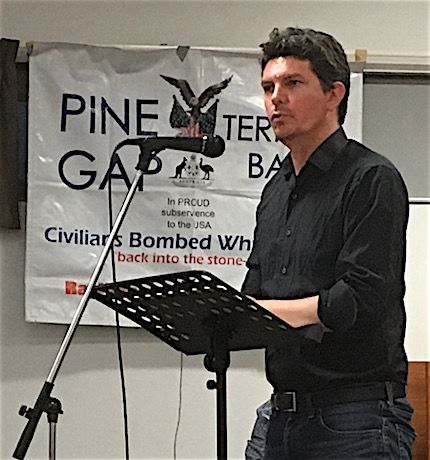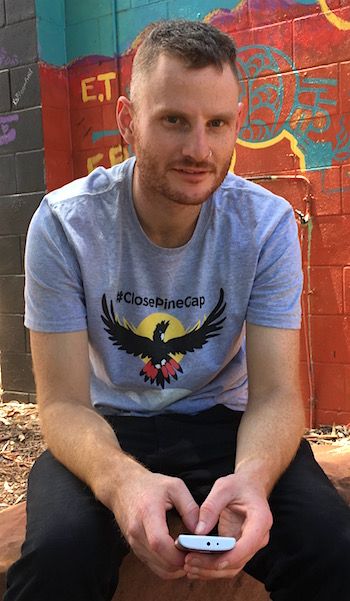Pine Gap's role in drone warfare: former Senator, former PM
20 November 2017
 By KIERAN FINNANE
By KIERAN FINNANE
Modified, 21 November 2017, 9.37am: headline changed.
Modified, 2 October 2018, 4.38pm: factual error corrected.
Justice John Reeves today overruled Crown objections to allow former senator Scott Ludlam to answer questions about the role Pine Gap military base has in the US drone warfare program.
Right: Mr Ludlam speaking at a public meeting in Alice Springs on Sunday night.
The questions came from defendant Andrew Paine, following the opening of the defence case in the trial of five Peace Pilgrims charged with entering the Pine Gap prohibited area in September last year.
Mr Paine said the question went to the defendants’ belief that they were acting to prevent harm to others and to the objective reasonableness of that belief.
Mr Paine struggled to put the question in a form that the Crown would not object to. After a number of attempts and objections on relevance, Justice Reeves asked: The nature of the emergency (prompting the five to act as they did) was relevant, was it not?
Crown Prosecutor Michael McHigh replied that what the accuse believed is relevant, but not the basis of that belief.
Justice Reeves replied: If the jury are required to consider evidence of the accused’s beliefs, they will have to determine whether or not those beliefs are “fanciful”.
Mr McHugh argued that what Mr Ludlam could speak to went well beyond the bounds of what the jury had to consider.
However, Justice Reeves allowed the question.
Mr Ludlam – one of the parliamentarians recently caught up in the dual citizenship fiasco and whom the High Court had found to be ineligible to hold his position – had described himself as “between jobs”. He was giving his evidence in a private capacity. Nonetheless, his former position was constantly raised by the Crown as possibly opening up inadmissibility under the Parliamentary Privileges Act. Both Mr Ludlam and the defendants tried to skirt that vulnerability.
 To Mr Paine’s question, Mr Ludlam responded that, based on open source information and information from whistle-blowers formerly in the US military whose accounts have been widely reported, it is clear that the Pine Gap facility has been engaged for some time in the targeting operations of the US drone program. He said this information has not been disputed by US authorities and gives rise to moral, ethical and deep legal questions for the US.
To Mr Paine’s question, Mr Ludlam responded that, based on open source information and information from whistle-blowers formerly in the US military whose accounts have been widely reported, it is clear that the Pine Gap facility has been engaged for some time in the targeting operations of the US drone program. He said this information has not been disputed by US authorities and gives rise to moral, ethical and deep legal questions for the US.
As an Australian citizen, he holds “grave concerns” about Pine Gap’s involvement in drone assassinations.
Left: Mr Paine, during a break from court.
Mr McHugh objected. This was opinion, hearsay, how could it be admissible in a criminal trial?
Justice Reeves did not make a ruling. In any case, Mr Ludlam had finished answering the question.
However, Justice Reeves ruled as irrelevant Mr Paine’s next question on Pine Gap’s involvement in a potential nuclear war.
If he answers that, said Mr McHugh, it must breach either parliamentary privilege or the hearsay and opinion rules of evidence.
Justice Reeves said it was not relevant to the defences the accused were seeking to raise under the Commonwealth Criminal Code [ED:- previously reported as under the Defence (Special Undertakings) Act 1952]– that they were responding to an “extraordinary emergency” and acting in defence of self and others.
Mr Paine’s later attempts to get evidence from Mr Ludlam about civil disobedience and its effectiveness as a way of trying to stop the emergency the defendants believed to be imminent was also ruled irrelevant.
Fellow Peace Pilgrim Margaret Pestorius had some success this afternoon, from the witness box, in tendering as evidence the views of another prominent Australian, the former Prime Minister Malcolm Fraser. She described a series of interviews with him and articles about his book, Dangerous Allies, published in the last year of his life, as “pivotal” in her forming the belief that it was necessary to act as she has done.
This followed years of activism in the peace movement, building in intensity and a variety of actions from 2003, when millions around the world demonstrated against the imminent US invasion of Iraq.
The court listened to an ABC radio interview in 2014 with Mr Fraser in which he called for the closure of Pine Gap as it was now involved in targeting for drones.
He said Australians operating out of Pine Gap involved in that targeting had no legal cover and could be vulnerable to charges of crimes against humanity.
He said he believed that drone warfare would eventually be outlawed by international agreement.
And he argued strongly for Australia to make its own foreign policy decisions: “I really think it is totally un-Australian to have a situation in which it is America that is in charge of our destiny,” said Mr Fraser.
This “eminent person was suddenly sitting inside our voice,” said Ms Pestorius.
The trial continues.


